Top 10 DevOps Best Practices For Your Business Growth in 2025
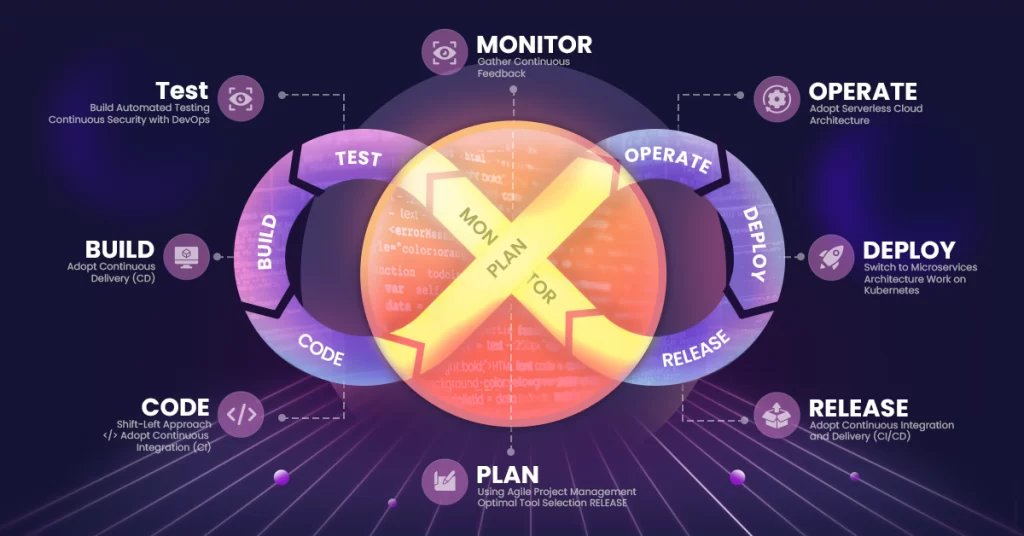
DevOps is a now popular term in the tech industry. It’s not just a trend – how successful companies will be doing things in 2025. But what does it matter?
DevOps connects the people who develop the software with the developers. It’s all about working smarter and faster. The goal? To develop better software and deliver it to users faster.
At its core, DevOps is built on teamwork. It takes ideas from Agile and applies them throughout the process of developing and deploying software. This means constant improvement and more communication.
One of the cool things about DevOps is the pipeline. This is where the magic happens. The code goes well from the first idea to the final product. Following DevOps pipeline best practices makes it fast and efficient, cutting out many of the usual headaches.
Why are so many businesses jumping on the DevOps train? Simple – it works. Organization that partner with DevOps consulting companies achieve more, make fewer mistakes, and keep their customers happy. Additionally, DevOps fosters collaboration, helping teams work together more effectively.
DevOps services allows companies to thrive. They can quickly test new ideas and adjust as things change. That’s great in a market that never stops.
So, ready to learn more? In this blog post, you’ll learn more about 2025 DevOps best practices.
Table of Contents
What Is DevOps?
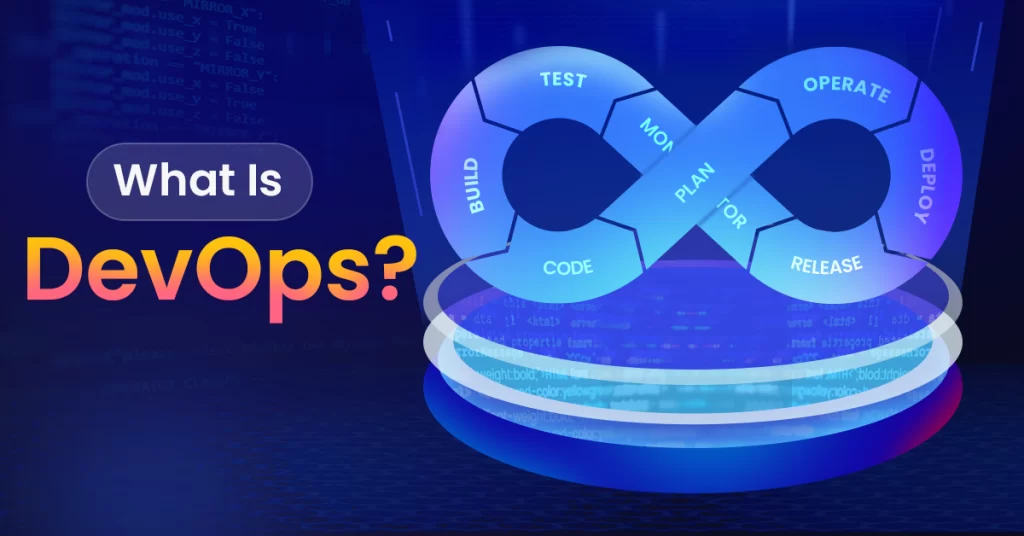
DevOps is a method of work in the tech domain that unites two significant groups — developers who make software and the operations team who handle its running and upkeep. Rather than operating independently, these teams combine efforts to create improved software more swiftly.
DevOps is similar to having everyone cooperate smoothly, exchanging parts and correcting issues along the way. You do not wait until the very end to see if all pieces fit together perfectly – instead, you continually check and enhance.
Within DevOps best practices, teams make use of particular tools and methods for automation. The idea behind this is that computers handle numerous repetitive tasks, freeing up individuals to concentrate on more significant problems.
How Does DevOps Solve Common Software Problems?
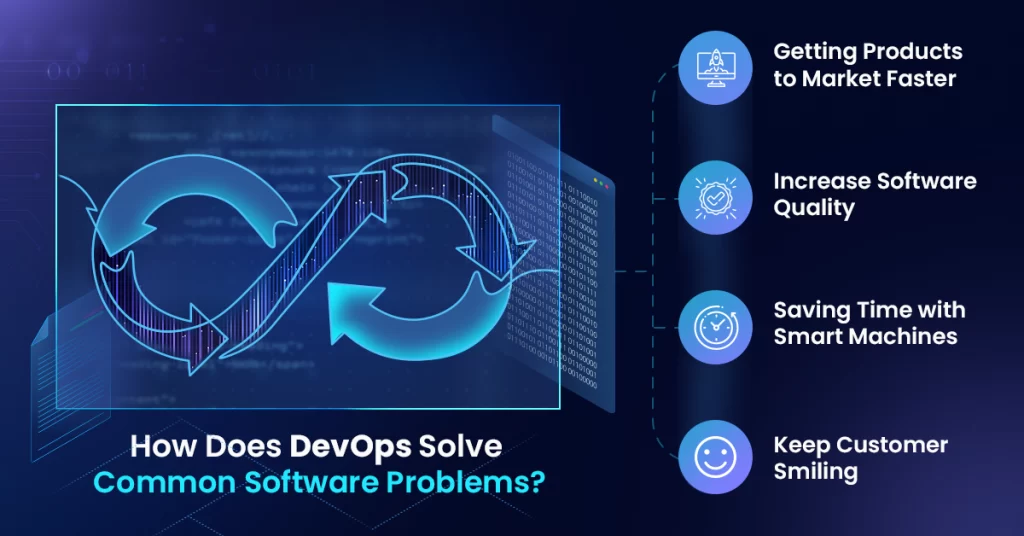
DevOps isn’t just a buzzword – it’s a problem-solver. Here’s how it tackles some big issues in software development:
✅ Getting Products to Market Faster
DevOps helps get new software and updates out faster. Teams work together smoothly, cutting down on delays. Automated processes mean less waiting around. The result? Your product hits the market quicker, beating competitors.
✅ Increase Software Quality
With Dev Ops best practice, quality checks happen all the time, not just at the end. Teams catch and fix bugs earlier. This means better, more reliable software. Customers get a product that works well from day one.
✅ Saving Time with Smart Machines
DevOps uses smart tools to automate repetitive tasks. This cuts down on human errors and saves time. What used to take days might now take hours. Teams can focus on creating new features instead of doing boring, manual work.
✅ Keep Customer Smiling
Happy customers are the goal. DevOps security best practices helps by delivering better software faster. When problems come up, they’re fixed quickly. Regular updates mean customers always have the latest features. This keeps them satisfied and loyal to your product.
By tackling these issues, best practices in DevOps transform how companies create and manage software. These DevOps monitoring best practices result in better products, happier teams, and satisfied customers.
Top 10 Best DevOps Practices You Must Adopt in Your Business in 2025
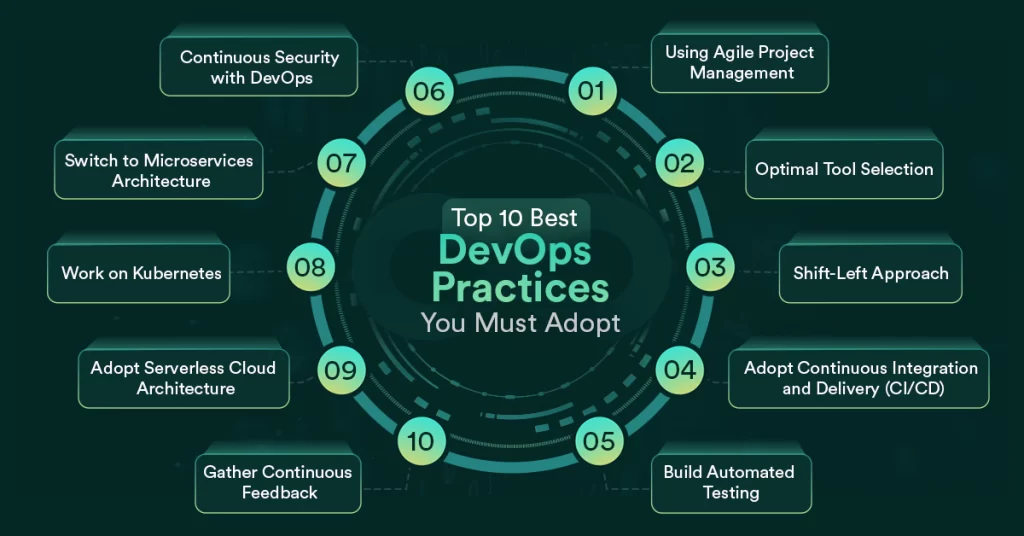
Discover the top 10 Dev Ops best practices to enhance efficiency, collaboration, and innovation in your business for 2025.
1️⃣ Using Agile Project Management
Agile is the heartbeat of modern DevOps. It’s all about flexibility and quick responses. Instead of planning everything up front, you break your project into small, manageable chunks called sprints.
Here’s why Agile rocks:
- It lets you adapt to changes quickly
- You can show progress to stakeholders regularly
- Teams stay motivated with frequent wins
Think of it like building a house. Instead of waiting months to see the finished product, you’re constantly making improvements and getting feedback. You may add a sunroom halfway through – with Agile, that’s no problem.
2️⃣ Optimal Tool Selection
Choosing the right tools can make or break your DevOps journey. But here’s the catch – you don’t need every shiny new tool on the market. It’s about finding what works for your team and project.
Consider these factors when picking tools:
- Does it integrate well with your existing setup?
- Is it easy for your team to learn and use?
- Will it grow with your needs?
For example, if you’re a small team working on a web app, you might not need the same hefty CI/CD pipeline as a large enterprise. Maybe a simple combo like Git, Jenkins, and Docker is all you need to get started.
3️⃣ Shift-Left Approach
“Shift-left” is DevOps-speak for moving testing and security to the beginning of your development process. It’s like catching a spelling mistake as you type, instead of after you’ve written a whole essay.
Benefits of shifting left:
- Catch bugs early when they’re cheaper to fix
- Improve overall code quality
- Reduce last-minute panic before releases
For instance, a team working on a mobile app might use static code analysis tools from day one. This catches common errors before they even make it to the testing phase, saving time and headaches down the road.
4️⃣ Adopt Continuous Integration and Delivery (CI/CD)
CI/CD is the backbone of modern DevOps. It’s all about keeping code flowing smoothly from development to production. With CI, you’re constantly merging code changes. CD takes it a step further, automatically deploying those changes.
Key components of a CI/CD pipeline:
- Version control (like Git)
- Automated building and testing
- Deployment automation
Take Etsy, for example. They deploy code to production over 50 times a day. This rapid pace lets them fix issues quickly and roll out new features faster than ever.
5️⃣ Build Automated Testing
Manual testing is so last decade. Automated testing is faster, more reliable, and lets your team focus on creating new features instead of checking old ones.
Types of automated tests to consider:
- Unit tests for individual components
- Integration tests for how components work together
- End-to-end tests for the whole system
Imagine you’re building a social media app. You could set up automated tests to check if posts are displaying correctly, if the ‘like’ button works, and if user profiles are updating. All this happens automatically every time you make a change.
6️⃣ Continuous Security with DevOps
Security isn’t an afterthought in DevOps – it’s baked into every step. This practice, often called DevSecOps, makes sure your code is secure from the get-go.
Key aspects of DevSecOps:
- Automated security scans in your CI/CD pipeline
- Regular vulnerability assessments
- Security training for all team members
For instance, a fintech startup might use tools like SonarQube to automatically check for security issues in their code. They could also run regular penetration tests to find weak spots before hackers do.
7️⃣ Switch to Microservices Architecture
Microservices break your application into smaller, independent parts. It’s like having a bunch of specialized tools instead of one big Swiss Army knife.
Benefits of microservices:
- Easier to update and scale individual components
- Teams can work on different services independently
- Better fault isolation
Netflix is a prime example of microservices in action. They have hundreds of microservices working together to bring you your favorite shows. If one service goes down (like recommendations), the rest of the app still works fine.
8️⃣ Work on Kubernetes
Kubernetes is like a skilled orchestra conductor for your containers. It manages where and when your application components run, ensuring everything works in harmony.
Why Kubernetes is a game-changer?
- Automates deployment and scaling
- Self-heals by restarting failed containers
- Manages storage and network resources
Imagine you’re running an e-commerce site during a flash sale. With the support of DevOps outsourcing companies, Kubernetes can automatically spin up more instances of your payment processing service to handle the surge in traffic, then scale back down when it’s over.
These DevOps security best practices ensure that your Kubernetes-managed applications remain secure and resilient, even during high-demand periods like flash sales.
These DevOps security best practices ensure that your Kubernetes-managed applications remain secure and resilient, even during high-demand periods like flash sales.
9️⃣ Adopt Serverless Cloud Architecture
Serverless allows you to focus on writing code without worrying about the underlying infrastructure. It’s like cooking in a fully equipped kitchen with someone else in charge.
Benefits of going serverless:
- Just pay for what you use
- Automatic scaling
- Reduced operating costs
Take the weather app, for example. Instead of having the server running 24/7, you can use AWS Lambda to run your code only when the user requests a prediction. This saves money and simplifies your operations.
🔟 Gather Continuous Feedback
Feedback is the secret sauce that keeps your Dev Ops best practices improving. It’s not just about user reviews – it’s about constantly learning from your processes and results.
Ways to gather feedback:
- User analytics and behavior tracking
- Regular retrospectives with your team
- Monitoring system performance and errors
Spotify, for instance, uses a tool called “Discover Weekly” to learn from user listening habits. They’re constantly tweaking their recommendation algorithm based on this feedback, leading to a better user experience.
Remember, these best DevOps practices aren’t one-size-fits-all. Mix and match based on your team’s needs and goals. The key is to keep experimenting and learning. That’s the true spirit of DevOps.
Benefits of Implementing DevOps Best Practices with CONTUS Tech
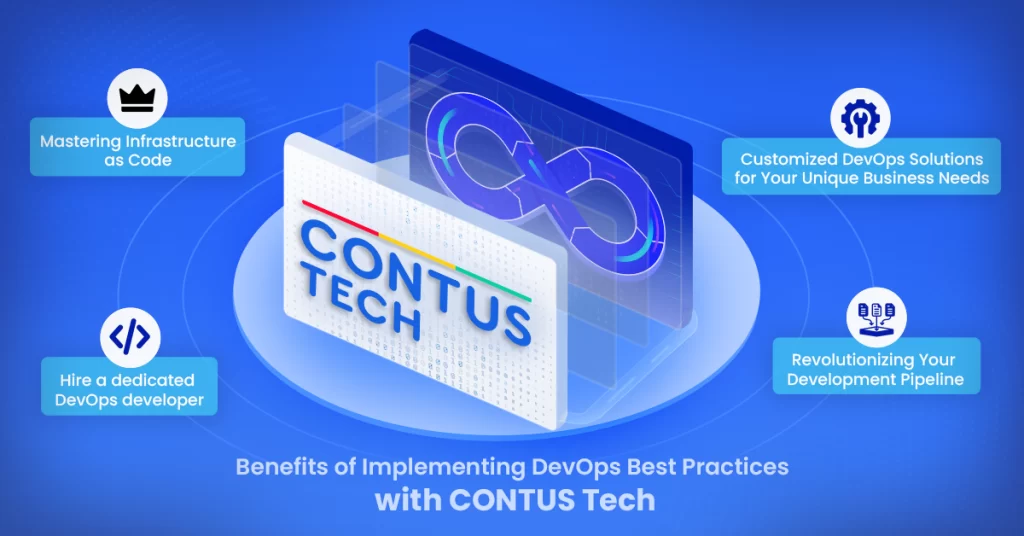
CONTUS Tech offers a range of DevOps solutions designed to streamline your development process. Here’s what you can expect when partnering with them for Implementing DevOps:
📌 Customized DevOps Solutions for Your Unique Business Needs
CONTUS conducts a deep dive into your organization, reading your unique requirements, challenges, and desires.
Whether you’re an agile startup or a well-established enterprise, CONTUS tailors their DevOps development services to fit your scale and complexity.
CONTUS doesn’t simply look at your current country; they bear in mind your current infrastructure, group dynamics, and destiny increase plans.
The DevOps best practice roadmap created using CONTUS is not just for fast profits. It’s designed to be sustainable and aligned together with your lengthy-time period business goals, imparting fee nicely into the future.
📌 Revolutionizing Your Development Pipeline
CONTUS implements next-level automation techniques that streamline your build and test processes.
By automating and standardizing the integration process, CONTUS who provides DevOps engineering services can help you to avoid the common pitfalls that occur when merging code.
With CONTUS’s optimized pipeline, you’ll be able to push updates and new features to market faster than ever before.
The automated checks and balances implemented by CONTUS catch bugs earlier in the development process.
You can more accurately estimate project timelines and resource needs with a well-structured best DevOps practice.
📌 Mastering Infrastructure as Code
CONTUS helps you treat your infrastructure like you treat your application code. This means you can version, test, and rollback infrastructure changes, bringing a new level of control and reliability to your operations.
With Infrastructure as Code, CONTUS ensures that your development, staging, and production environments are identical.
Need to spin up a new environment or scale your existing one? With CONTUS’s Infrastructure as Code implementation, it’s as simple as running a script
📌 Hire a dedicated DevOps developer
CONTUS Tech allows you to hire dedicated DevOps developers who are experts in their field.
Whether you need to grow your existing team or build a DevOps team from scratch, CONTUS offers flexible hiring models. You can choose a short-term contract for best DevOps practices or a long-term partnership for ongoing DevOps support, tailored to your specific needs.
Need your DevOps ability to grow quickly?
CONTUS’ dedicated developers not only work on your projects but also share their expertise with your existing team. This facilitates continuous learning and helps build your internal DevOps capabilities over time.
Closing Thoughts
Partnering with CONTUS Tech for DevOps security best practices isn’t just about new tools – it’s a game-changer for your whole business. They’ll tailor solutions to fit your needs, whether you’re a startup or a big company. With their help, you’ll ship better software faster and keep your customers happy.
Plus, you can hire DevOps Engineers to join your team, bringing in fresh skills and ideas. In the end, CONTUS Tech doesn’t just help you keep up – they set you up to lead in today’s fast-paced tech world.
Ready to transform your development process? Contact CONTUS Tech to start implementing the Best DevOps Practices for 2025. Start optimizing your processes today!


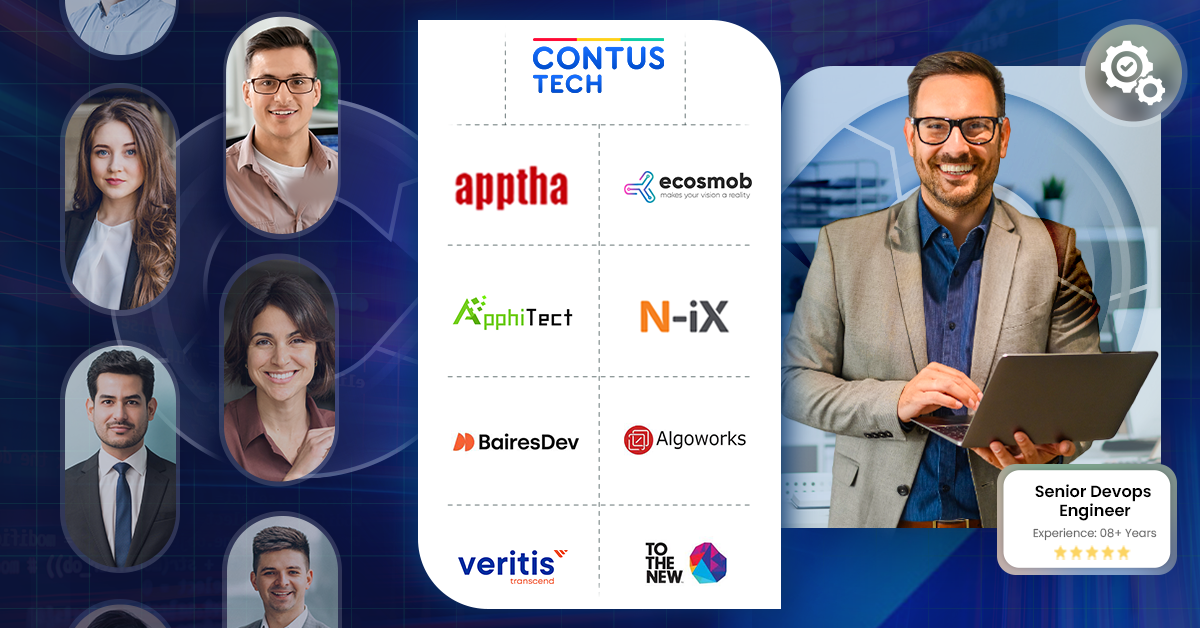

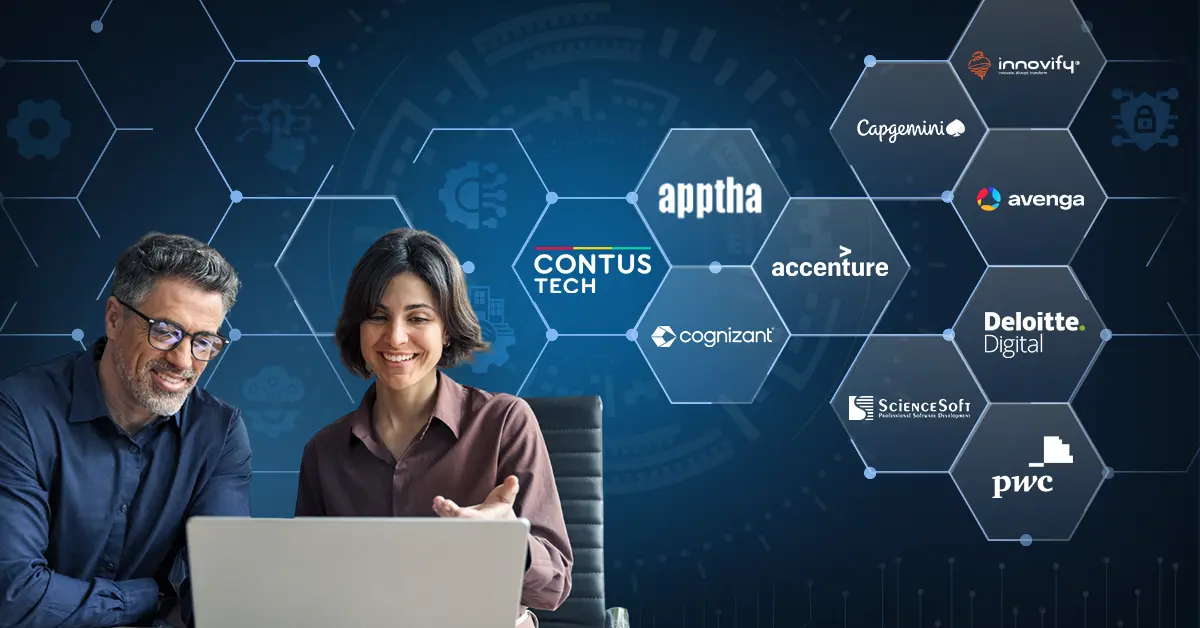
Switching to serverless architecture with DevOps best practices was really simplified our operations. Now we are planning to focus more on coding and less on managing infrastructure costs. Need to discuss more about the same.
As a senior DevOps developer, I’ve experienced the benefits of applying CI/CD and infrastructure as code. These above mentioned DevOps best practices will streamline our operations and minimize the risks. Prioritize these practices to deliver exceptional value to the clients.
DevSecOps ensures our applications are secure from the start. But we want to know which DevOps best practices could be the perfect fit for our microservices architecture, ensuring scalability and reliability.
Shifting left with the DevOps best practices has made our software development process really effective. But we are planning focusing on security and testing to deliver more secure applications. So we are planning to outsource it.
Hi, I’ve seen how DevOps best practices transforms the workflows, making them more agile and really responsive. From CI/CD automation to continuous feedback loops, each step improves our ability to innovate and keep on deliver the quality software.
How does DevSecOps will improve the security in the DevOps pipeline?
DevSecOps integrates security into every step of the DevOps process. By automating security scans and the regularly assessing vulnerabilities you can ensure that your code remains secure as it evolves.
Should I invest in serverless architecture for my DevOps strategy?
Serverless architecture simplifies the infrastructure management, reduces costs and scales automatically. It’s an excellent fit for DevOps best practices allowing teams to focus on code rather than servers.
What’s the role of continuous feedback in DevOps?
Continuous feedback loops are essential in DevOps. They help teams to learn from each release, refine processes and improve both the product and user experience which make it a key DevOps best practice in 2024.
Is automated testing really necessary for DevOps?
Yes, automated testing is a cornerstone of DevOps best practices. It speeds up the development process, reduces human error and ensures that new code integrates smoothly with existing features.
Can small teams will benefit from DevOps best practices in 2024?
Yes Absolutely! DevOps best practices will be scalable. Even small teams can use tools like CI/CD pipelines and automated testing to streamline workflows, save time and improve product quality.
What makes Agile project management essential in DevOps?
Agile’s flexibility and focus on continuous improvement will align perfectly with the DevOps best practices. It allows teams to adapt quickly, deliver frequently and maintain high quality standards throughout the development cycle.
Why should I consider the microservices in my DevOps strategy?
Microservices allows you to break down your application into smaller and manageable components. This will make you easier to update, scale and isolate issues all of which are key DevOps best practices in 2024.
What is the shift-left approach in DevOps?
The shift-left approach in DevOps involves moving testing and security earlier in the development process. This proactive strategy catches bugs and security issues early which will reduce the cost and complexity of fixes later.
How does Kubernetes will fit into the DevOps best practices?
Kubernetes automates deployment, scaling & management of containerized applications. It will ensure your app components work seamlessly together making it a important tool in modern DevOps strategies.
How does DevOps can improve the software quality?
DevOps best practices focus on continuous testing and integration which will catch the bugs early. By automating these processes team can identify and fix the issues very quickly leading to the higher software quality from the start.